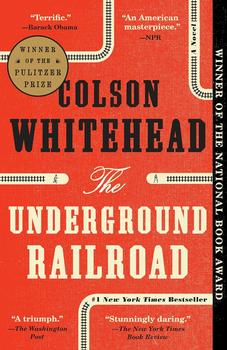Summary | Excerpt | Reading Guide | Discuss | Reviews | Beyond the Book | Readalikes | Genres & Themes | Author Bio

A Novel
by Colson Whitehead
Just before sunset an agent bought her for two hundred and twenty-six dollars. She would have fetched more but for that season's glut of young girls. His suit was made of the whitest cloth she had ever seen. Rings set with colored stone flashed on his fingers. When he pinched her breasts to see if she was in flower, the metal was cool on her skin. She was branded, not for the first or last time, and fettered to the rest of the day's acquisitions. The coffle began their long march south that night, staggering behind the trader's buggy. The Nanny by that time was en route back to Liverpool, full of sugar and tobacco. There were fewer screams belowdecks.
You would have thought Cora's grandmother cursed, so many times was she sold and swapped and resold over the next few years. Her owners came to ruin with startling frequency. Her first master got swindled by a man who sold a device that cleaned cotton twice as fast as Whitney's gin. The diagrams were convincing, but in the end Ajarry was another asset liquidated by order of the magistrate. She went for two hundred and eighteen dollars in a hasty exchange, a drop in price occasioned by the realities of the local market. Another owner expired from dropsy, whereupon his widow held an estate sale to fund a return to her native Europe, where it was clean. Ajarry spent three months as the property of a Welshman who eventually lost her, three other slaves, and two hogs in a game of whist. And so on.
Her price fluctuated. When you are sold that many times, the world is teaching you to pay attention. She learned to quickly adjust to the new plantations, sorting the nigger breakers from the merely cruel, the layabouts from the hardworking, the informers from the secret-keepers. Masters and mistresses in degrees of wickedness, estates of disparate means and ambition. Sometimes the planters wanted nothing more than to make a humble living, and then there were men and women who wanted to own the world, as if it were a matter of the proper acreage. Two hundred and forty-eight, two hundred and sixty, two hundred and seventy dollars. Wherever she went it was sugar and indigo, except for a stint folding tobacco leaves for one week before she was sold again. The trader called upon the tobacco plantation looking for slaves of breeding age, preferably with all their teeth and of pliable disposition. She was a woman now. Off she went.
She knew that the white man's scientists peered beneath things to understand how they worked. The movement of the stars across the night, the cooperation of humors in the blood. The temperature requirements for a healthy cotton harvest. Ajarry made a science of her own black body and accumulated observations. Each thing had a value and as the value changed, everything else changed also. A broken calabash was worth less than one that held its water, a hook that kept its catfish more prized than one that relinquished its bait. In America the quirk was that people were things. Best to cut your losses on an old man who won't survive a trip across the ocean. A young buck from strong tribal stock got customers into a froth. A slave girl squeezing out pups was like a mint, money that bred money. If you were a thing—a cart or a horse or a slave—your value determined your possibilities. She minded her place.
Finally, Georgia. A representative of the Randall plantation bought her for two hundred and ninety-two dollars, in spite of the new blankness behind her eyes, which made her look simpleminded. She never drew a breath off Randall land for the rest of her life. She was home, on this island in sight of nothing.
Cora's grandmother took a husband three times. She had a predilection for broad shoulders and big hands, as did Old Randall, although the master and his slave had different sorts of labor in mind. The two plantations were well-stocked, ninety head of nigger on the northern half and eighty-five head on the southern half. Ajarry generally had her pick. When she didn't, she was patient.
Excerpted from The Underground Railroad (Oprah's Book Club) by Colson Whitehead. Copyright © 2016 by Colson Whitehead. All rights reserved. No part of this excerpt may be reproduced or reprinted without permission in writing from the publisher.
Not doing more than the average is what keeps the average down.
Click Here to find out who said this, as well as discovering other famous literary quotes!
Your guide toexceptional books
BookBrowse seeks out and recommends the best in contemporary fiction and nonfiction—books that not only engage and entertain but also deepen our understanding of ourselves and the world around us.